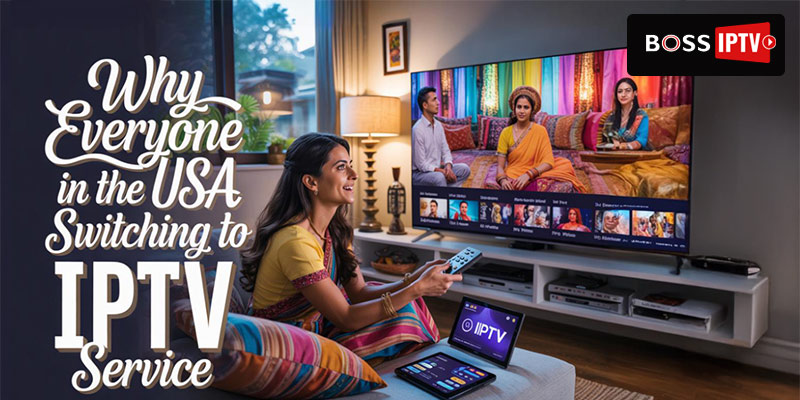
Television has changed. People used to wait for shows to air or pay high bills for cable. Now, many in the USA have started using IPTV instead. It gives more control, better value, and a way to watch on their own time.
IPTV works through the internet. That means no dish on the roof, no long wires, and no set schedule. For many, it just feels easier. This shift is happening fast, and there are clear reasons why more people are making the move.
IPTV stands for Internet Protocol Television. It streams live TV and on-demand content over an internet connection. Unlike cable or satellite, IPTV does not rely on physical lines or satellite signals. Instead, it sends video through a digital connection.
A user picks a show. The IPTV system sends it right away. No waiting. No schedule. Content plays as soon as it loads. Some services also store programs, so viewers can watch them later.
IPTV offers more control. Viewers pick what they want and when they want it. No cable boxes. No contracts. Only the shows people like.
Costs often drop. Monthly prices tend to be lower than cable bills. People don’t pay for unused channels. They choose packages that match their habits.
Another reason is variety. Many IPTV services offer both local and international channels. Movies, live sports, news — all in one place.
Cable uses older technology. It sends fixed channels to every home, whether used or not. IPTV only sends what gets requested. That saves data. It also helps streams load faster.
Picture quality on IPTV usually stays sharp. HD and 4K shows play well, if the internet stays steady. Cable signals sometimes weaken or drop, especially during storms.
Setup feels simpler too. IPTV works through apps or streaming devices. No need for technicians or long wires.
The short answer is yes — legal IPTV services follow proper licensing rules. These providers pay to show content. That includes sports, news, and entertainment.
Illegal services often copy streams without permission. That breaks copyright laws. They also pose risks. Malware and sudden shutdowns happen often.
To stay safe, people check if a service has public info, secure payment options, and legal distribution rights.
Several factors help someone pick the right IPTV provider. These include:
Checking user reviews helps too. People often share what worked and what didn’t. Some services offer trial periods, which help with testing before paying.
The channel list depends on the provider. Common ones include:
Many services also include video-on-demand sections. These let users browse and play movies or shows anytime.
The process takes only a few steps. Most users need a device like a smart TV, smartphone, tablet, or streaming box. After picking a provider, they install an app and enter login info. Internet speed plays a big role. Faster connections give smoother viewing.
Some providers send a ready-to-use box. It plugs into the TV. Setup usually takes just a few minutes.
The rise in internet speed and Wi-Fi access has helped IPTV grow. Viewers want more flexibility and lower bills. IPTV delivers both.
Many also prefer fewer ads and more content choices. Some plans include DVR features, letting people pause or rewind live shows.
Streaming fits modern habits. People no longer wait for shows to air. IPTV supports that lifestyle.
People across the USA now move toward IPTV. They want freedom, better value, and more control over what they watch. IPTV answers those needs.
Boss IPTV supports this change by keeping things simple. Streaming works over a steady internet connection. Devices like smart TVs, tablets, or boxes all work well. The setup is quick, and support is ready when help is needed.
Channel lists stay fresh. Plans fit all kinds of viewers — from sports fans to families. The service works. The switch feels natural. IPTV is not just a trend. It’s a better way to watch.
1. What is IPTV service?
IPTV stands for Internet Protocol Television. It streams live TV and on-demand content over the internet instead of using cable or satellite.
2. Is IPTV legal in the United States?
Yes, IPTV is legal when the provider is licensed to distribute the content. Always choose services that follow proper copyright rules.
3. What devices work with IPTV?
IPTV works on smart TVs, phones, tablets, streaming boxes like Firestick, and computers.
4. How much does IPTV cost per month?
Most IPTV plans cost between $10 and $30 per month, depending on the channel list and features included.
5. Do I need a fast internet connection for IPTV?
A stable internet speed of at least 10 Mbps is recommended for smooth streaming. Higher speeds support HD or 4K quality.
6. Can I watch live sports with IPTV?
Yes, many IPTV providers offer live sports channels, including football, basketball, cricket, and international events.
7. How do I know if an IPTV provider is reliable?
Look for clear pricing, user reviews, responsive customer support, and legal content rights. Trial options also help test the service before subscribing.
Fill the form to get instant access!